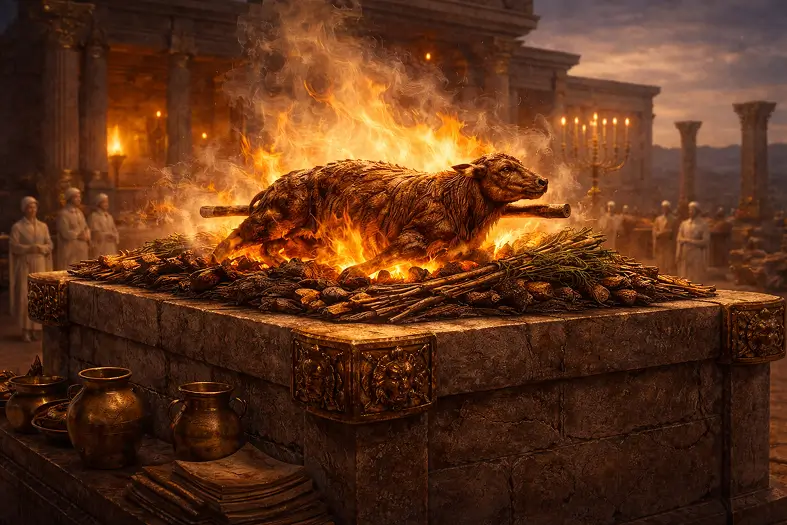


The Korban Pesach must not be eaten raw or boiled, but only roasted with fire.
This mitzvah prohibits eating the Paschal lamb raw (na) or cooked in water (mevushal). The Torah requires it to be roasted whole, directly over fire. Rambam (Hilchot Korban Pesach 8:9–10) codifies that deviation from roasting invalidates the mitzvah.
Sefer HaChinuch (Mitzvah 7) explains that roasting symbolizes speed and urgency, reflecting Israel’s haste in leaving Egypt. Talmud (Pesachim 41a–41b) discusses the difference between na (partially raw) and mevushal (cooked), ruling both are prohibited. Rashi (Ex. 12:9) emphasizes that roasting represents freedom and nobility, unlike boiling which suggests servitude. Ramban interprets roasting as a public declaration of redemption, recalling that Israel openly rejected Egyptian idolatry.
Commentary & Classical Explanation:
Contrast with Eating Pesach Properly (Mitzvah 408):
Parallel to Other Korban Laws (Mitzvah 351, 353):


Concerns the Beit HaMikdash, korbanot (offerings), and priestly service.
Represents Emunah—the deep, inner trust in Hashem’s presence, oneness, and constant involvement in our lives. This badge symbolizes a heartfelt connection to G-d, rooted in belief even when we cannot see. It is the emotional and spiritual core of many mitzvot.
Represents the concept of spiritual intentionality, purity, and sanctity—set apart for a higher purpose.
Mitzvot that define and deepen the relationship between a person and their Creator. These include commandments involving belief, prayer, Shabbat, festivals, sacrifices, and personal holiness — expressions of devotion rooted in divine connection.

Dive into mitzvos, prayer, and Torah study—each section curated to help you learn, reflect, and live with intention. New insights are added regularly, creating an evolving space for spiritual growth.

Explore the 613 mitzvos and uncover the meaning behind each one. Discover practical ways to integrate them into your daily life with insights, sources, and guided reflection.

Learn the structure, depth, and spiritual intent behind Jewish prayer. Dive into morning blessings, Shema, Amidah, and more—with tools to enrich your daily connection.

Each week’s parsha offers timeless wisdom and modern relevance. Explore summaries, key themes, and mitzvah connections to deepen your understanding of the Torah cycle.